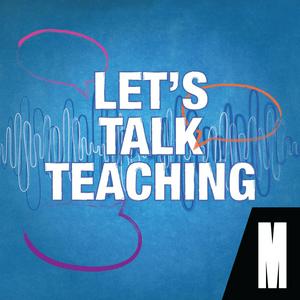Game Plan: Transforming Maths Teaching through Strategic Play
For many teachers, games have long been a classroom staple - but their impact goes far beyond surface-level engagement. When designed and used with intent, game-based learning can transform mathematical thinking, improve classroom dynamics, and create lasting connections to content.In this episode, Dr James Russo shares what makes a truly effective maths game, unpacking six key principles from his research and the importance of 'games into investigations'. Primary school teacher Matt Hale brings the classroom perspective, highlighting the joy, depth and unexpected power of games that promote strategic thinking, collaborative dialogue and differentiated learning.You’ll also hear how games like Fact or Fiction, Multiple Mysteries, and Choc Chip Cookies are sparking genuine mathematical thinking - and why the simplicity of cards, dice and paper often wins over digital solutions.In this episode, you’ll learn:The difference between gamification and game-based learning - and why it matters.What the six principles of effective maths games are and how to apply them.How game mechanics support strategic thinking, reflection and investigation.Why low-tech games often outperform digital tools in learning and engagement. The role of games in assessment, student agency and classroom culture. Topics we explore:(00:00) Introduction to Game-Based Learning (02:00) Game-Based Learning vs Gamification(03:27) Games That Built Deeper Thinking(04:33) Stickiness and Replayability (05:51) Favourite Maths Games(09:47) Six Principles of Effective Maths Games(11:04) Turning Games into Investigations(13:02) Deepening Learning by Changing Rules(15:03) Games for Assessment (17:12) Sneaky Learning and Student Confidence(18:05) Managing Competition in the Classroom(19:47) Six Key Principles Explained(26:40) Love Maths Website and Simple Games(27:52) Non-Digital vs. Digital Games(31:38) New International Research into Games(33:36) How to Start Using Games in TeachingResources: Love Maths by Michael MinasFree, simple maths games for use at both home and at school.SURF MathsA flexible, visual framework to support mental maths instruction. SURF helps teachers personalise strategy use, build consistency across classrooms, and strengthen students' mathematical thinking and language. Maths 300Subscription-based maths lesson library, supporting inquiry through rich tasks and games.Wheel of NamesA free random selector tool that was designed for choosing winners or names.Related research:Unpacking game mechanics: Five types of whole-class mathematical gamesTransforming mathematical games into investigationsFive principles of educationally rich mathematical gamesSpecial Guests: Dr James RussoSenior Lecturer, School of Curriculum, Teaching and Inclusive EducationFaculty of Education, Monash UniversityMatt HaleTeacherSt Patrick’s Primary School, MentoneIf you’re enjoying Let’s Talk Teaching, don’t forget to subscribe, rate and review! You can follow us on Instagram, X and Facebook, and share your thoughts on the show by using the hashtag #letstalkteachingpodcast. If you’re interested in hearing more about the short courses, undergraduate and postgraduate study options that Monash Education offers, please visit our website.We are grateful for the support of Monash University’s Faculty of Education in producing this podcast.


